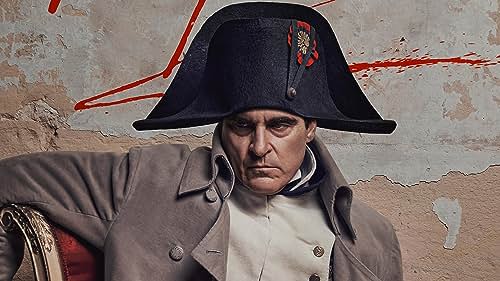A look at Napoleon (R)

Not many directors nowadays would contemplate making a movie about the life of Napoleon Bonaparte – battles and political conflicts included. But, then again, Ridley Scott is no ordinary director.
He’s really nailed it in this magnificent two-and-a-hour epic tracing Napoleon’s rise from gunnery commander in 1789 and into the 1790s to the crowned Emperor of France at an 1805 Notre Dame Cathedral pageant.
Whether or not he was in Paris to witness the guillotining of Queen Marie Antoinette is unknown, but Scott doesn’t mess about. There’s Napoleon (Joaquin Phoenix) on his stallion astride his cavalry horse watching from the sidelines as the lethal blade drops.
Not long after, Napoleon doesn’t mess about when the Paris mob threatens the safety and security of ordinary Parisians. He orders his gunners to fire whiffs of grapeshot directly into the ranks of the uprising’s leadership group and seemingly has no regrets. Later on he’s the mastermind behind the seizure of the port of Toulon from the occupying British in 1793.
His patron and friend Barras (Tahar Rahim) guides him through some of the tricky political earthquakes of the later 1790s. But overriding all of this is Napoleon’s love of Josephine (Vanessa Kirby). It’s almost despairing because he’s often away on campaigns – particularly in Italy and Egypt – and Josephine turns out to be not a particularly loyal lover.
Nonetheless Napoleon graduates, through the assistance of his Revolutionary friend Barras (Tahar Rahim), to a position of political power as one of the three consuls of the later 1790s. The other two – Emmanuel-Joseph Sieyes and Pierre-Roger Ducos – were really just figureheads with Napoleon the true ruler of France. And despite having re-captured the key port of Toulon he’s still almost seized by an inferiority complex when he whines at the British ambassador: “You think you’re so great because you have boats!”
Perhaps the most revealing insight into Napoleon’s character comes during France’s invasion of Russia only to find its capital Moscow abandoned and deserted. He spurs his mount towards the capital’s centre narrowly avoiding being decapitated by falling masonry.
His relationship with Josephine is the key to his happiness when Napoleon finally reaches Paris on a semi-retreat march. The sensual and beautifully coiffured Josephine hasn’t been entirely blameless during his absence yet Napoleon, after a couple of mighty outbursts, can’t deny his unflinching love of her.
And of course the climax of the action in this film awaits: the decisive and bloody Battle of Waterloo. The British infantry, masterfully organised by British general Lord Wellington (Rupert Everett), form blocks of squares across the battlefield with the prostrate musketeers firing first, followed by the kneeling cadre and finally the standing group unleash the third volley.
Napoleon and the French are on their last legs when late in the afternoon the Prussian troops, Wellington’s allies, arrive and Napoleon and the French are done for. Ridley Scott has organised the most outstanding battle scenes I’ve ever seen and that includes movies about more recent major conflicts such as the two World Wars. Arthur Wellesley, the Duke of Wellington, stayed on as commander-in-chief of the occupying forces in France until late 1818.
He was derisive of Napoleon’s supposedly humble upbringing although the French Emperor’s father had been a lawyer in their native Corsica and a member of that island’s minor nobility.
Scott shows us beautiful scenes of Napoleon in exile on the island of St. Helena south of South Africa, and it’s there where Napoleon suffers an early death in 1821, aqed just 52. He’d been in exile since October 1815. Josephine lives out her life with her daughter from her first marriage on a country estate a long way from Paris.
Phoenix is great as Napoleon – alternating between brooding, preening himself, seething over his cuckolding by Josephine and eventually in top form at his triumphal parades and march-pasts.
And he seems completely at ease beneath either his bicorne two-sided headgear or his jaunty tri-colour cockade.
Before their inauguration as Emperor and Empress was carried out in Notre Dame cathedral, at their marriage ceremony Josephine was 36 and Napoleon just 30.
And if you’re wondering how many French soldiers and sailors died during Napoleon’s long, long campaigns the figure is around a staggering 3 million.
I’ve given this film four-and-a-half stars. As I’ve said the battle scenes are unbelievably realistic and the costuming plus the palace interiors of late 18th century-early 19th century Paris and regional chateaux are exquisite.
